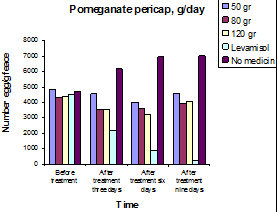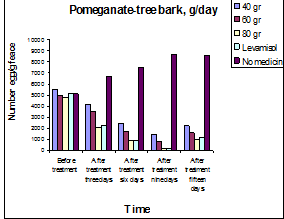 |
 |
| Figure 1. Effect of Pomegranate pericarp on FEC in goats | Figure 2. Effect of Pomegranate tree bark on FEC in goats |
|
MEKARN Conference 2010 |
The different doses of Pomegranate pericarp (50, 80, 120g) and pomegranate-tree bark (40, 60, 80, 120g) were given to the goats to see the effect of the extract on treating nematodes. The extract was produced by boiling Pomegranate pericarp and pomegranate-tree bark in a liter of water for 2 hours until the volume was reduced to 200 ml. This extract was allowed to cool and then given orally to the goats. In the control treatment, goats were injected by Levamisol (1ml). Alcaloit and tannins contents in the Pomegranate-tree bark were 0.24g and 16.8g, respectively. While Pomegranate pericarp contained only tannins (50.6g) and had no Alcaloit content. Pomegranate-tree bark was showed the lethal dose in goat at 120g. At the dose of 80 g Pomegranate-tree bark was given a good effect on nematodes as similar as treated by Levamisol after 9 days, without any negative effect on physical function of goats such as heart rate, respiration rate, body temperature and rumen movement. Positive effect on treating nematodes in goats by Pomegranate pericarp was found at the dose of 120g.
 |
 |
| Figure 1. Effect of Pomegranate pericarp on FEC in goats | Figure 2. Effect of Pomegranate tree bark on FEC in goats |